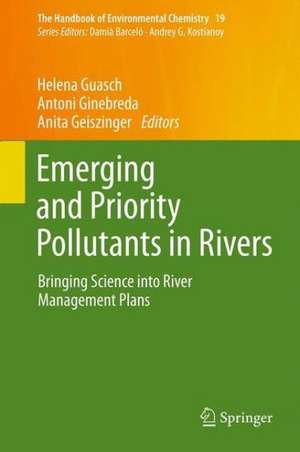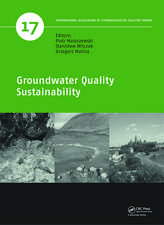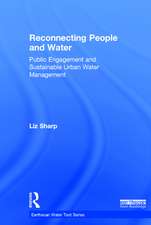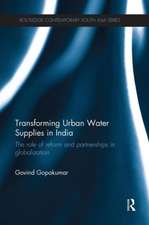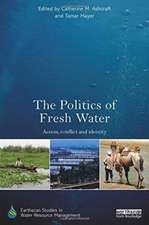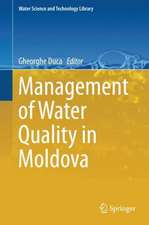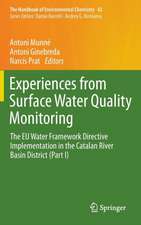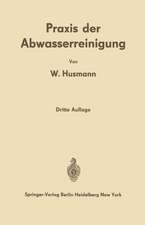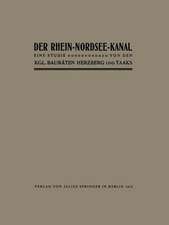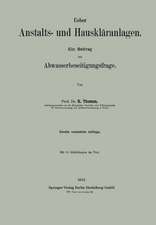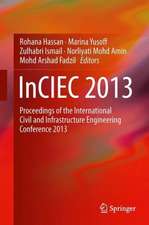Emerging and Priority Pollutants in Rivers: Bringing Science into River Management Plans: The Handbook of Environmental Chemistry, cartea 19
Editat de Helena Guasch, Antoni Ginebreda, Anita Geiszingeren Limba Engleză Paperback – 13 apr 2014
| Toate formatele și edițiile | Preț | Express |
|---|---|---|
| Paperback (1) | 1214.90 lei 6-8 săpt. | |
| Springer Berlin, Heidelberg – 13 apr 2014 | 1214.90 lei 6-8 săpt. | |
| Hardback (1) | 1221.07 lei 6-8 săpt. | |
| Springer Berlin, Heidelberg – 22 feb 2012 | 1221.07 lei 6-8 săpt. |
Din seria The Handbook of Environmental Chemistry
- 18%
 Preț: 1819.46 lei
Preț: 1819.46 lei - 18%
 Preț: 1827.32 lei
Preț: 1827.32 lei - 18%
 Preț: 2102.76 lei
Preț: 2102.76 lei - 18%
 Preț: 2089.35 lei
Preț: 2089.35 lei - 18%
 Preț: 2481.57 lei
Preț: 2481.57 lei - 18%
 Preț: 1223.43 lei
Preț: 1223.43 lei - 5%
 Preț: 1419.56 lei
Preț: 1419.56 lei - 15%
 Preț: 639.41 lei
Preț: 639.41 lei -
 Preț: 392.97 lei
Preț: 392.97 lei - 5%
 Preț: 366.56 lei
Preț: 366.56 lei - 18%
 Preț: 1826.69 lei
Preț: 1826.69 lei - 15%
 Preț: 640.71 lei
Preț: 640.71 lei - 18%
 Preț: 728.91 lei
Preț: 728.91 lei - 5%
 Preț: 1424.89 lei
Preț: 1424.89 lei - 18%
 Preț: 1225.94 lei
Preț: 1225.94 lei -
 Preț: 386.00 lei
Preț: 386.00 lei - 18%
 Preț: 732.70 lei
Preț: 732.70 lei - 15%
 Preț: 641.53 lei
Preț: 641.53 lei - 5%
 Preț: 1416.81 lei
Preț: 1416.81 lei - 15%
 Preț: 644.82 lei
Preț: 644.82 lei - 5%
 Preț: 1421.76 lei
Preț: 1421.76 lei -
 Preț: 386.39 lei
Preț: 386.39 lei -
 Preț: 389.49 lei
Preț: 389.49 lei - 5%
 Preț: 719.02 lei
Preț: 719.02 lei - 5%
 Preț: 714.63 lei
Preț: 714.63 lei - 18%
 Preț: 1215.22 lei
Preț: 1215.22 lei -
 Preț: 392.97 lei
Preț: 392.97 lei - 18%
 Preț: 1832.08 lei
Preț: 1832.08 lei - 15%
 Preț: 639.73 lei
Preț: 639.73 lei - 5%
 Preț: 1925.56 lei
Preț: 1925.56 lei -
 Preț: 381.98 lei
Preț: 381.98 lei - 5%
 Preț: 363.97 lei
Preț: 363.97 lei -
 Preț: 386.00 lei
Preț: 386.00 lei - 5%
 Preț: 1423.39 lei
Preț: 1423.39 lei - 15%
 Preț: 643.16 lei
Preț: 643.16 lei -
 Preț: 383.12 lei
Preț: 383.12 lei - 15%
 Preț: 642.51 lei
Preț: 642.51 lei - 5%
 Preț: 716.09 lei
Preț: 716.09 lei - 5%
 Preț: 1407.87 lei
Preț: 1407.87 lei - 18%
 Preț: 1231.01 lei
Preț: 1231.01 lei
Preț: 1214.90 lei
Preț vechi: 1481.59 lei
-18% Nou
Puncte Express: 1822
Preț estimativ în valută:
232.50€ • 242.43$ • 193.23£
232.50€ • 242.43$ • 193.23£
Carte tipărită la comandă
Livrare economică 21 martie-04 aprilie
Preluare comenzi: 021 569.72.76
Specificații
ISBN-13: 9783642431678
ISBN-10: 3642431674
Pagini: 284
Ilustrații: XIV, 270 p.
Dimensiuni: 155 x 235 x 15 mm
Greutate: 0.36 kg
Ediția:2012
Editura: Springer Berlin, Heidelberg
Colecția Springer
Seria The Handbook of Environmental Chemistry
Locul publicării:Berlin, Heidelberg, Germany
ISBN-10: 3642431674
Pagini: 284
Ilustrații: XIV, 270 p.
Dimensiuni: 155 x 235 x 15 mm
Greutate: 0.36 kg
Ediția:2012
Editura: Springer Berlin, Heidelberg
Colecția Springer
Seria The Handbook of Environmental Chemistry
Locul publicării:Berlin, Heidelberg, Germany
Public țintă
ResearchCuprins
Occurrence and elimination of pharmaceuticals during conventional wastewater treatment.- Bioavailability of organic contaminants in freshwater environments.- The use of attached microbial communities to assess ecological risks of pollutants in river ecosystems.- The use of photosynthetic fluorescence parameters from autotrophic biofilms for monitoring the effect of chemicals in river ecosystems.- Consistency in diatom response to metal-contaminated environments.- Advances in the multi-biomarker approach for risk assessment in aquatic ecosystems.- How to link field observations with causality? Field and experimental approaches linking chemical pollution with ecological alterations.- Evaluating ecological integrity in multi-stressed rivers: from the currently used biotic indices to newly developed approaches using biofilms and invertebrate.- Comparing chemical and ecological status in Catalan rivers. Analysis of river quality status following the Water Framework Directive.
Recenzii
From the reviews:
“‘Emerging and priority pollutants in rivers’ provide an overview of methods used for assessing water quality status. The book is clearly written and comprehensive, with a good balance between conceptual definitions and field applications. Both environmental chemists and environmental toxicologists would benefit from this valuable source of methodological information.” (Philippe Garrigues, Environmental Science and Pollution Research, Vol. 19, 2012)
“‘Emerging and priority pollutants in rivers’ provide an overview of methods used for assessing water quality status. The book is clearly written and comprehensive, with a good balance between conceptual definitions and field applications. Both environmental chemists and environmental toxicologists would benefit from this valuable source of methodological information.” (Philippe Garrigues, Environmental Science and Pollution Research, Vol. 19, 2012)
Textul de pe ultima copertă
The enduring changes in the aquatic environment and the increasing influx of contaminants call for novel conceptual and methodological approaches to relating chemical pollution and ecological alterations in ecosystems. This volume highlights the latest advances concerning the sampling, analyses, occurrence, bioavailability, and effects of emerging and priority pollutants in European rivers, the current status of the River Management Plans in Europe, and the applicability of the newly developed techniques for water monitoring purposes. The topics are discussed in the context of the EU Water Framework Directive, evaluating their shortcomings and providing a basis for doing away with them. Linking scientific research and river management practices, this book is an invaluable source of information for environmental chemists, aquatic scientists, ecologists and water managers.
Caracteristici
Links scientific research and management practices Richly illustrated An invaluable source of information for researchers and advanced students in the fields of environmental sciences, risk assessment and controlling, toxicology and ecology, decision-makers in government, industrial and regulatory bodies Includes supplementary material: sn.pub/extras
